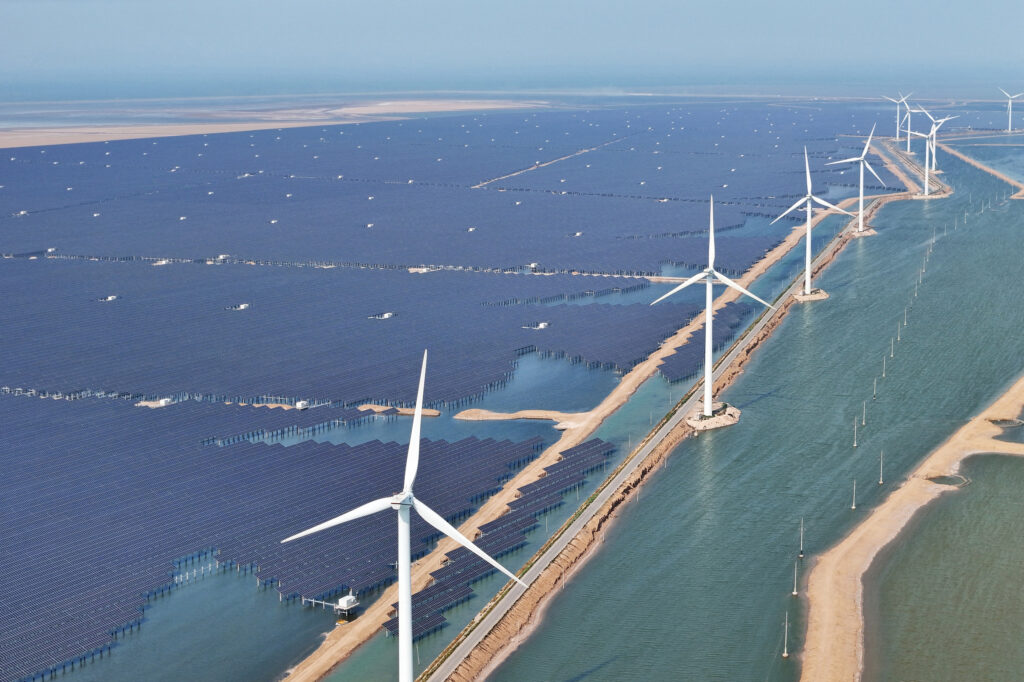Delegates from 184 countries met in Geneva Tuesday to resume negotiations in the last scheduled opportunity to halt the escalating plastic pollution crisis through a legally binding global agreement.
Negotiations for the U.N. Intergovernmental Negotiating Committee on Plastic Pollution started three-and-a-half years ago but reached an impasse, primarily over whether to limit plastic production, during what was supposed to be the final talks last November.
Most countries, led by the Global South, want to limit plastic production. But fossil fuel-producing nations and the petrochemical industry favor managing waste instead.
Plastic production doubled between 2000 and 2019 and is expected to triple from today’s levels by 2060.
And since barely 9 percent of plastic is recycled, every year about 20 to 25 million tons of plastic waste contaminates lakes, rivers and seas, according to the United Nations Environment Program, or UNEP. Scientists have found plastics everywhere they’ve looked, on the highest mountains, at the bottom of the sea floor and in the human brain and mother’s milk. Once in tissues, plastics increase the risk of respiratory, reproductive and gastrointestinal problems and some cancers.
“We are facing a global crisis,” said Luis Vayas Valdivieso, chair of the negotiating committee during the opening plenary. “The urgency is real, the evidence is clear and the responsibility is on us.”
A natural disaster did not cause this crisis, said Valdivieso, who oversaw the draft “chair’s text” in December to serve as the start of these negotiations. “Since it is a human-made crisis, it must be tackled through human effort and global cooperation.”
With nearly all plastics made from fossil fuels, scientists and health policy experts have urged negotiators to make protecting human and environmental health core treaty objectives. That means capping and reducing plastic production, ending the use of toxic chemicals in plastics and reducing toxic emissions from all stages of plastics’ life cycle.
“The world wants and indeed needs a plastic convention or treaty, because the crisis is getting out of hand,” said UNEP Executive Director Inger Andersen in a press briefing. “We are producing around 430 million tons annually, and a large proportion of that ends up untreated and unmanaged in the open environment.”
People who are living with that pollution are outraged, she said.
Katrin Schneeberger, Switzerland’s director of the Federal Office for the Environment, acknowledged that plastic pollution is choking lakes, harming wildlife and threatening human health, but added, “this is no call for a production cap.”
That message was important to clarify to producing countries during informal meetings leading up to the talks, she said. “Reaching a shared understanding that measures are needed on both the production and consumption sides can help unlock the negotiations.”
Securing an agreement on reducing plastic production is the most contentious issue at play, Christina Dixon, who is attending the talks on behalf of the nonprofit Environmental Investigation Agency, told Inside Climate News. Many of the leaders advocating for reducing plastic production come from the Global South, she said, but industry and oil-producing countries are leaning hard on them to drop this provision.
“The negotiations are under threat from the vested interests of the fossil fuel industry and we heard loud and clear today that oil-producing countries are holding firm on their desire to ensure we leave Geneva without anything meaningful,” Dixon said, referring to statements from oil-producing countries objecting to production limits.
Polluted by Plastic in the Womb
About 620 organizations attended the talks as observers, rather than parties to the negotiations. During the plenary, more than a dozen representatives of environmental, public health and environmental justice groups urged negotiators to cap production and provide for a just transition away from fossil fuels.
A Tunisia representative of the Women’s Working Group on Ending Plastic Pollution urged the negotiators to recognize plastic pollution as a human health emergency. “Scientific studies now confirm that microplastics have been found in human placentas on both the maternal and the fetal sides,” the woman said. “Exposure begins before birth, and its consequences may last a lifetime.”

Abraham Francis of the International Indigenous Peoples Forum on Plastics called on states to affirm and promote Indigenous people’s rights and ensure the full, effective, equitable and direct participation of Indigenous peoples in decision making and implementation of the treaty. “Our ancestral wisdom and knowledge systems offer vital solutions to the plastics crisis, including other environmental crises, addressing its entire life cycle from extraction to disposal.”
Several representatives of the chemical and plastics industry lobbied in favor of continued production.
“We champion an agreement that is inclusive of countries, effectively combats plastic pollution, promotes the circularity of plastics and enables society to continue to benefit from plastics,” said Greg Skelton on behalf of the International Council of Chemical Associations and the Global Partners for Plastic Circularity.
Conor Carlin of the Society of Plastics Engineers said plastics have transformed the modern world, while acknowledging that the growing volume of plastic waste presents an urgent challenge. “As engineers, innovators and problem solvers, we are uniquely positioned to develop the next generation of materials and technologies that enable greater recyclability, biodegradability and resource efficiency.”
A representative of the Youth Plastic Action Network urged negotiators to protect human health and ecosystems. “If we fail to deliver the treaty, healthcare systems will be strained under rising cancers and toxic exposures. Billions will be spent managing pollution instead of preventing it, and oceans could hold more plastic than fish, collapsing coastal economies and food securities.”
John Beard Jr. spoke on behalf of the Break Free from Plastics movement and the U.S. Environmental Justice Delegation. “I come to you from the belly of the beast in Port Arthur, Texas, a cancer cluster thanks to the petrochemical industry.”
Unchecked production of plastics is accelerating a crisis that jeopardizes the climate, biodiversity, human health and the planet’s ability to sustain life, Beard said. “A treaty that does not cap plastic production, eliminate toxic chemicals and ensure a just transition for those most impacted is a treaty destined to fail.”
Valdivieso, chair of the negotiating committee, appeared optimistic that negotiators would reach an agreement by the end of next week, despite outstanding differences of opinion. “I trust that there will be enough political will to overcome them, the same will that has helped us make progress in our work and brought us to the brink of a historic moment.”
Whether the countries and communities most impacted by unchecked plastic production will benefit from that moment remains to be seen.
About This Story
Perhaps you noticed: This story, like all the news we publish, is free to read. That’s because Inside Climate News is a 501c3 nonprofit organization. We do not charge a subscription fee, lock our news behind a paywall, or clutter our website with ads. We make our news on climate and the environment freely available to you and anyone who wants it.
That’s not all. We also share our news for free with scores of other media organizations around the country. Many of them can’t afford to do environmental journalism of their own. We’ve built bureaus from coast to coast to report local stories, collaborate with local newsrooms and co-publish articles so that this vital work is shared as widely as possible.
Two of us launched ICN in 2007. Six years later we earned a Pulitzer Prize for National Reporting, and now we run the oldest and largest dedicated climate newsroom in the nation. We tell the story in all its complexity. We hold polluters accountable. We expose environmental injustice. We debunk misinformation. We scrutinize solutions and inspire action.
Donations from readers like you fund every aspect of what we do. If you don’t already, will you support our ongoing work, our reporting on the biggest crisis facing our planet, and help us reach even more readers in more places?
Please take a moment to make a tax-deductible donation. Every one of them makes a difference.
Thank you,

















